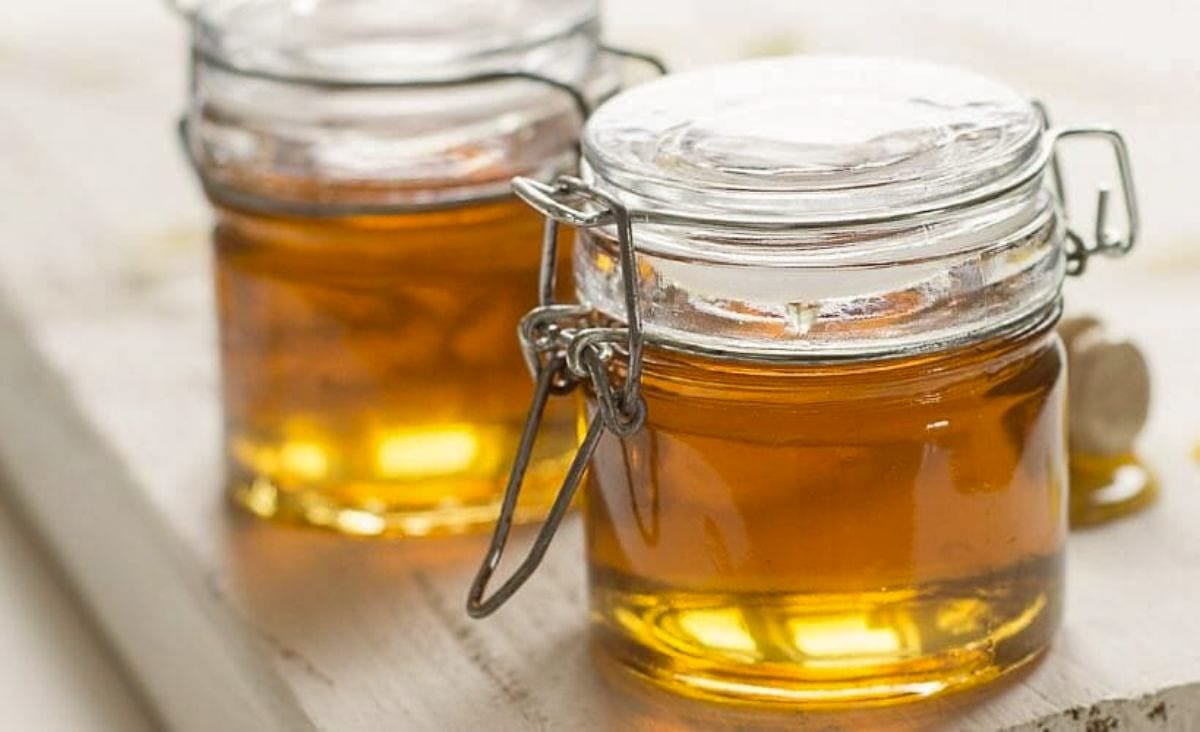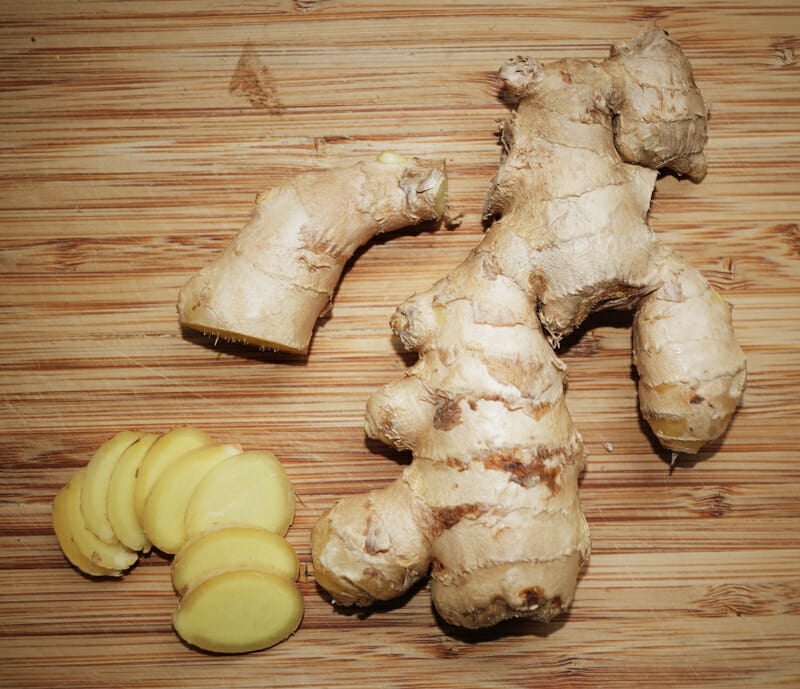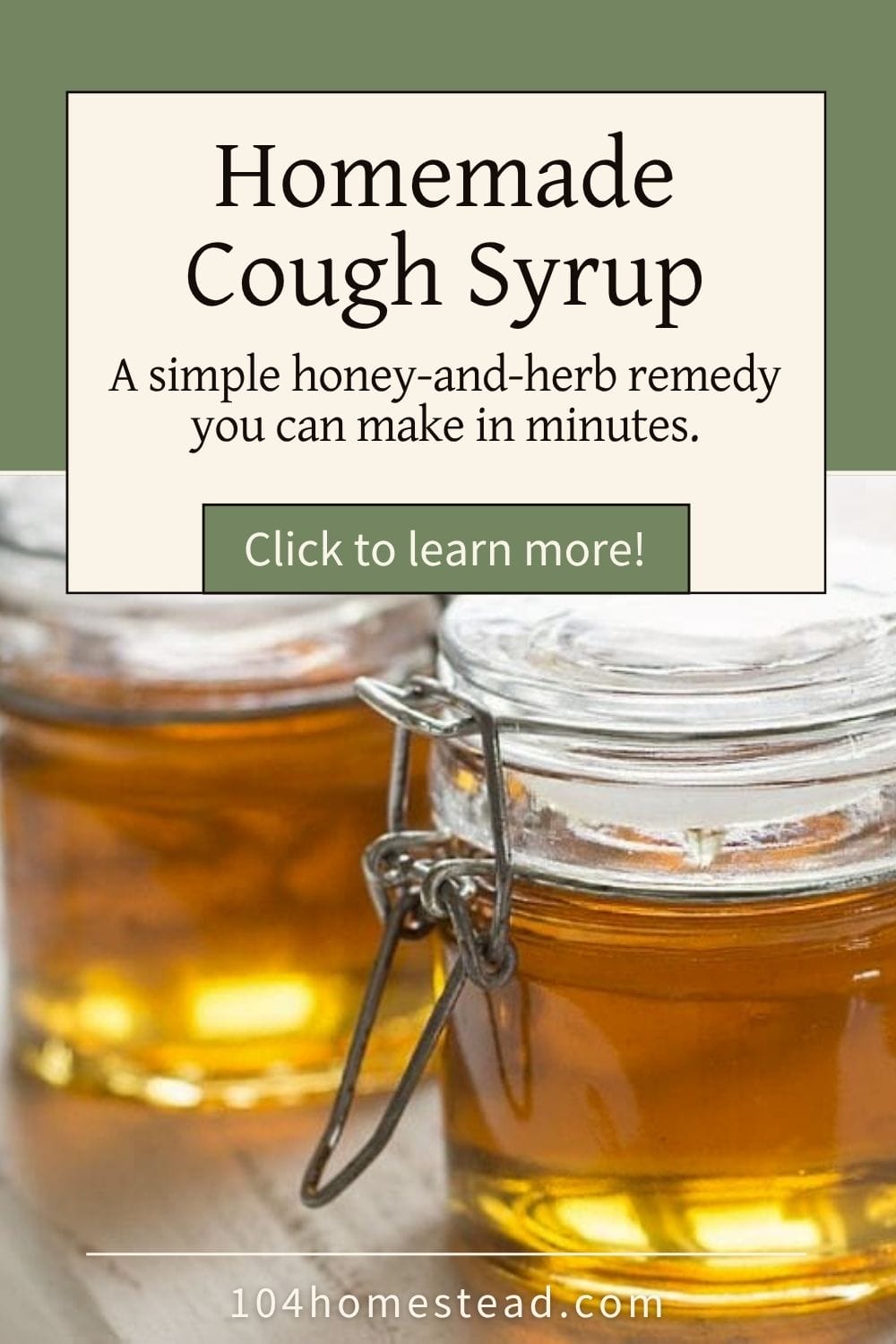Homemade Cough Syrup (A Simple Honey-and-Herb Remedy That Works)
Make a soothing homemade cough syrup with honey, ginger, and thyme. It comes together fast and offers natural relief when that stubborn cough won’t quit.

There’s something about a lingering cough that can wear you down faster than the cold that started it. Around here, once the hacking sets in, I want something that soothes without sending me searching for ingredients I can’t pronounce. That’s why I’ve been making this homemade cough syrup for years. It’s one of the first things I reach for when someone in the house starts sounding rough.
It uses everyday stuff I almost always have around, takes just a few minutes, and honestly tastes way better than anything I’ve grabbed off a shelf. And it works! A spoonful before bed or when that scratchy tickle starts up makes a world of difference.
I’ll walk you through how I make it, why each ingredient matters, and a few variations you can try depending on the kind of cough you’re dealing with.
Why This Homemade Cough Syrup Works
I’ve tried a lot of natural remedies over the years, and this one is the one I keep coming back to. Every ingredient does something useful, and together they make a soothing syrup you can feel working pretty fast.
Honey Calms and Coats the Throat
Raw buckwheat honey is my first choice because of its dark, rich flavor and higher antioxidant levels, but any raw honey works. Honey coats the throat, eases irritation, and has natural antimicrobial properties. If you’ve ever tried to sleep through a scratchy cough, you know why this matters.
Just a reminder: honey isn’t safe for children under 1.
Ginger Helps When Everything Feels Tight or Inflamed
Fresh ginger brings that warm kick and helps everything feel a little less tight. When someone here sounds like they’re barking more than coughing, I always bump ginger up a bit in the infusion. It also helps with that heavy, congested feeling you get at the tail end of a cold.
Thyme Helps Break Up Mucus and Calms Spasms
Thyme doesn’t get enough credit. It’s one of the best herbs for respiratory support, and I’ve leaned on it for everything from persistent coughs to sinus congestion. It’s packed with thymol, which basically just means it helps loosen things up and calm those maddening coughing fits.

Lime Adds Brightness and Helps Cut Through Mucus
The lime gives this syrup a fresh, bright flavor and adds a little vitamin C support. It also helps balance the sweetness of the honey so it’s not overly heavy.
How I Make This Homemade Cough Syrup (Step-by-Step)
This syrup is simple to make, but a couple of small details make a difference. Here’s how I make it in my kitchen.
Prep the Honey and Lime
Thinly slice the lime and layer the slices in a small bowl or jar. Pour the honey over the top and let the two sit together while you start the herbal base. The honey pulls out the juices and softens the lime slices. I usually give it a stir or two as it sits so the flavors meld.
Make the Thyme and Ginger Infusion
Add fresh thyme, sliced ginger, and water to a saucepan and slowly bring it to a boil. Once it starts boiling, turn the heat down and let it gently simmer until the liquid reduces by half. Reducing it is what makes it strong enough to work. You want the herbs strong so they blend right into the honey.
If I’m the one coughing, I let it simmer longer for a stronger infusion.

Let the Infusion Cool (Warm Is the Sweet Spot)
This is the part I always rush, especially when someone’s miserable, but it really does need to cool to warm. If it’s too hot, you’ll destroy the very enzymes in the honey that make this syrup worth making.
Warm to the touch is perfect.
Combine, Stir, and Strain
Pour the warm infusion into the honey-lime mixture and stir until everything dissolves into a smooth, golden syrup. Strain out the solids and pour the finished syrup into a jar with a good lid. I like using half-pint mason jars because they fit nicely in the fridge and I can make a couple batches at once if cold season hits hard.
How to Use Homemade Cough Syrup
Everyone’s different, but here are the general guidelines we follow in my home:
- Adults and kids 10+: 1 tablespoon as needed
- Children 1–10: 1 teaspoon as needed
- Not for children under 1 (because of the honey)
If someone starts coughing at bedtime, I’ll give the nighttime version (below) and it usually settles things down pretty fast.
How to Store Homemade Cough Syrup
Your syrup should be stored in the refrigerator. It usually keeps about 2–3 weeks in the fridge. If it starts looking bubbly or smelling off, just make a new batch.
Honey-based syrups don’t freeze well, so I stick to small batches.
Easy Tweaks Depending on the Cough
After making this for years, I’ve come up with a few tweaks that help depending on what kind of cough we’ve got going around.
For a Dry, Scratchy Cough: Add a small pinch of marshmallow root to the thyme and ginger infusion before simmering. It makes the syrup extra soothing.
For Chest Congestion: Add a little fresh sage or a slice of lemon (along with the lime). Both help loosen thicker mucus.
For Bedtime Relief: Use a lighter-flavored honey and add a small piece of cinnamon stick to the infusion. It makes the syrup a little smoother and more comforting right before bed.
A Kid-Friendly Version: Swap lime for lemon and use a lighter honey. Most kids go for the milder, sweeter version.
Troubleshooting: What to Do If Something Seems Off
These were the little issues I ran into while I was still figuring this recipe out.
The syrup is too thin: You probably didn’t reduce the infusion enough. You can pour everything back into the pot and warm it gently until it thickens (just don’t let it boil hard).
It crystallized in the fridge: Totally normal with raw honey. Set the jar in warm water for a few minutes and it’ll loosen right up.
It tastes bitter: That usually means the mixture was too hot when the honey went in, or the lime peel steeped too long. Both are easy to fix the next time you make it.
Looking for more natural remedies?
Once you’ve got a homemade cough syrup in the fridge, why stop there? Here are some other simple, effective herbal remedies you can make right at home:
- Boost your immune system naturally with this sweet and powerful elderberry syrup recipe that’s easy to make and tastes amazing.
- Soothe sinus pressure and congestion by learning how to make your own vapor rub using essential oils.
- Get ahead of seasonal sniffles with a batch of fire cider, a bold herbal tonic for cold and flu season.
- Sip your way to comfort and wellness with this lemon-infused herbal tea that eases pain and keeps you going.
- Ready to build a natural home apothecary? Start here with the top reasons to start crafting your own herbal remedies.
Common Questions About Making Cough Syrup
These are the ones I get asked most often.
Pin this recipe now so you’ve got it ready when cold season hits!

Every winter, I make at least one batch of this homemade cough syrup. It’s simple, it’s natural, and it works. The ingredients are easy to keep on hand, and you can adjust it depending on the kind of cough you’re dealing with. If you’re the type who’d rather make something than buy it, you’ll probably like this one.
And if you have a favorite homemade remedy you swear by, I’d love to hear what you use in your own home.

DIY Cough Syrup With Honey, Ginger & Thyme
This post may contain paid links. If you make a purchase using the links in this recipe, I may earn a commission.
Ingredients
Instructions
- Place the sliced lime in a bowl and pour the honey over the top. Let this sit while you prep the herb base. It gives the honey time to draw out the lime’s flavor and juice.1 small Lime, 3/4 c. Honey
- In a small saucepan, combine the thyme, ginger, and water. Bring it to a boil, then reduce the heat and let it simmer uncovered until the liquid is reduced by half (about 1 cup of strong herbal infusion).1/2 c. Thyme, 1 inch Ginger, 2 c. Water
- Remove the saucepan from heat and allow it to cool until it’s just warm (think bathwater temperature).
- Remove saucepan from the heat and let cool to bathwater temperature.
- Add the honey-lime mixture to the cooled herbal infusion and stir well to combine.
- Strain your finished syrup into a clean jar. Store in the refrigerator for up to 2-3 weeks.
Notes
- Adults and children 10+: 1 tablespoon as needed
- Children 1–10: 1 teaspoon as needed
- Not for children under 1 (due to the honey)




